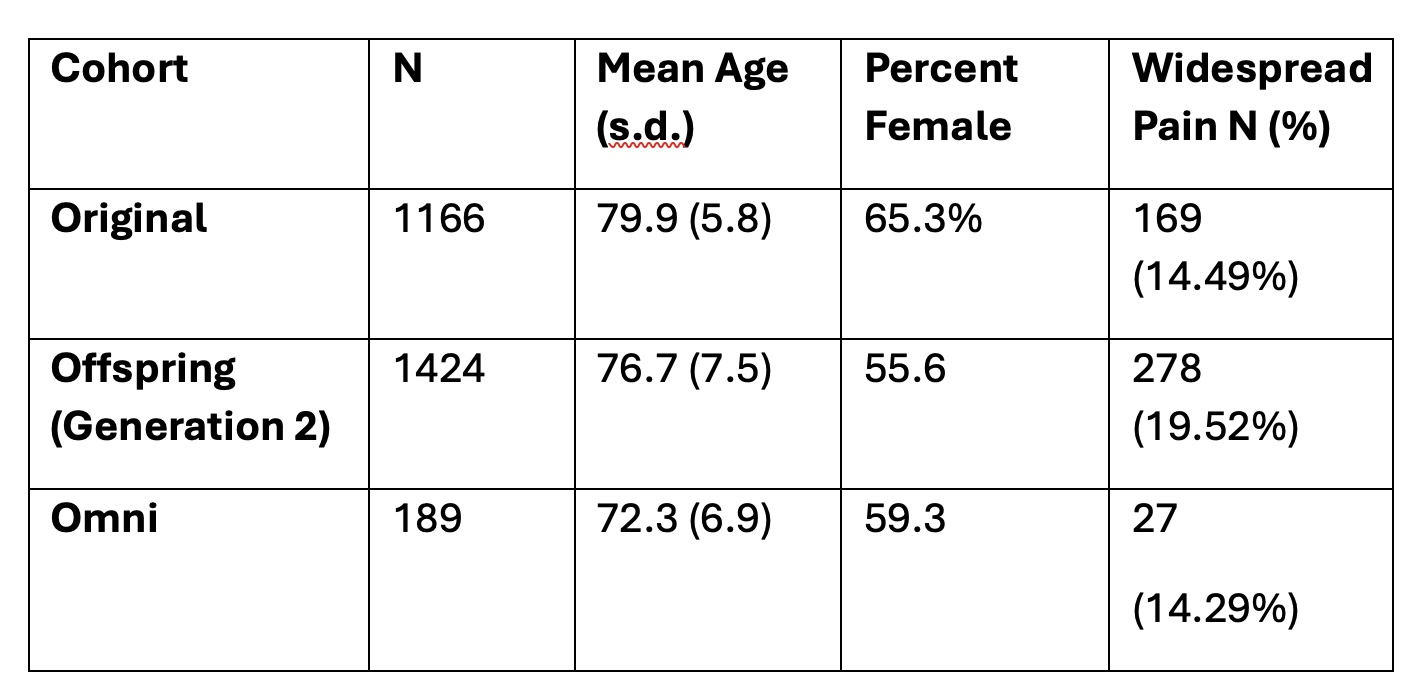Session Information
Date: Saturday, November 16, 2024
Title: Abstracts: Pain in Rheumatic Disease Including Fibromyalgia
Session Type: Abstract Session
Session Time: 1:00PM-2:30PM
Background/Purpose: In the general community, widespread musculoskeletal pain is common and often disabling.. Epidemiologic surveys in the US and Europe in the 1990s and early 2000s reported a prevalence of 10-11% in adults with a higher prevalence in persons over age 40.3,4 While research on pain has increased, there has been little study of whether the prevalence of widespread pain has changed. We sought to address this question in 2 generations of the Framingham Heart Study cohorts, both community-based samples
Methods: We studied the original cohort of the Framingham Heart Study in 2002-2005 and Generation 2, the sons and daughters of the original cohort and their spouses in 2019-2021, when they were at a similar age to the original cohort. A minoritized community sample (OMNI cohort) recruited at the same time as Generation 2 was also assessed in 2019-2021 at the same exam cycle. All participants were asked whether they had any joint pain on most days and, if they said yes, were asked, using a homunculus, about locations of pain including regions of the back. Using data from the homunculus, we determined whether a participant met the following definition of widespread pain: pain on the left side of the body and pain on the right side of the body; pain above the waist and pain below the waist, and axial skeletal pain (cervical spine or thoracic spine or low back). We tallied the prevalence of widespread pain in each cohort and then tested for cohort differences using a chi-square test.
Results: The cohorts when surveyed were, in general, elderly, with mean age in the 70s (see table 1) and the majority of participants were women. Widespread pain was present in just over 14% of the original cohort and in the OMNI cohort. Between 19 and 20% of the Offspring had widespread pain. When we combined data from currently surveyed Offspring and OMNI and compared this to the earlier surveyed Original Cohort, we found that there was a significant increase in the prevalence of widespread pain (c2 = 9.3, p = .002), with the Original cohort having slightly higher age and higher proportion of females.
Conclusion: The prevalence of widespread pain has risen in the past 20 years in older persons. This may be motivating increased treatment for pain and warrants further investigation to understand secular trends and reasons why widespread pain has increased among older adults.
The prevalence of widespread pain has risen in the past 20 years in older persons. This may be motivating increased treatment for pain and warrants further investigation to understand secular trends and reasons why widespread pain has increased among older adults.
To cite this abstract in AMA style:
Felson D, Zertuche J, Ukonu N, LaValley m, Clancy M, Neogi T. Secular Changes in Widespread Pain Across Two Generations: The Framingham Heart Study [abstract]. Arthritis Rheumatol. 2024; 76 (suppl 9). https://acrabstracts.org/abstract/secular-changes-in-widespread-pain-across-two-generations-the-framingham-heart-study/. Accessed .« Back to ACR Convergence 2024
ACR Meeting Abstracts - https://acrabstracts.org/abstract/secular-changes-in-widespread-pain-across-two-generations-the-framingham-heart-study/

